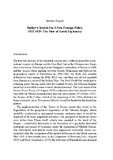| dc.contributor.author | Klapsis, Antonis | |
| dc.date.accessioned | 2016-04-04T12:09:45Z | |
| dc.date.available | 2016-04-04T12:09:45Z | |
| dc.date.issued | 2005 | |
| dc.identifier.uri | http://hdl.handle.net/11728/7399 | |
| dc.description.abstract | The first two decades of the twentieth century was a difficult period for multinational
empires in Europe and the Near East, but in the Ottoman case things
were even worse. Following Austria-Hungary’s annexation of Bosnia in 1908
and the vicious ethnic fighting between Greeks, Bulgarians and Serbs in the
geographical region of Macedonia in 1904–1908, the Porte was soundly
defeated
by Italy during the 1911–1912 war, and then was all but expelled
from Europe as a result of the Balkan Wars. The First World War would prove
a turning point. Having sided with the Central Powers, the Ottoman Empire
started an irreversible course towards dismemberment. The conclusion of the
Sevres Peace Treaty (10 August 1920) confirmed what had already become
clear after the Mudros Armistice less than two years earlier (30 October 1918):
the Empire of the Sultan –which at the beginning of the 1910s stretched in
three continents (Asia, Europe and Africa)– would be limited in the Anatolian
plateau. | en_UK |
| dc.language.iso | en | en_UK |
| dc.publisher | The Institute for Balkan studies | en_UK |
| dc.relation.ispartofseries | Balkan Studies;Volume 46 | |
| dc.rights.uri | http://creativecommons.org/licenses/by-nc-nd/4.0/ | en_UK |
| dc.subject | Greek Diplomacy | en_UK |
| dc.subject | Turkey | en_UK |
| dc.subject | Lausanne Peace Treaty | en_UK |
| dc.title | Turkey’s Search For A New Foreign Policy, 1923-1925: The View of Greek Diplomacy | en_UK |
| dc.type | Article | en_UK |


